Shopify vs Volusion: Final verdict
Shopify and Volusion both offer comprehensive ecommerce solutions, but they cater to different business needs and user preferences.
-
Shopify (Overall Grade: 8.1/10)
excels in providing a robust, scalable platform for businesses of all sizes. It offers a wide range of ecommerce tools, advanced marketing features, and strong security measures. Shopify’s ease of use, extensive app store, and superior customer support make it an ideal choice for businesses looking to grow and manage their online stores efficiently. When comparing Shopify vs Volusion, Shopify stands out for its professional design options, comprehensive ecommerce features, and overall value for money. -
Volusion (Overall Grade: 6.6/10)
is a solid choice for small to medium-sized businesses seeking an affordable and user-friendly ecommerce platform. It offers a range of customizable templates, essential ecommerce tools, and basic marketing features. However, Volusion falls short in terms of advanced integrations, AI capabilities, and overall performance compared to Shopify. For users prioritizing budget and simplicity, Volusion provides a feasible solution, but it may not meet the needs of larger or more complex online stores.

|

|
|
|---|---|---|
|
Design functionalities & templates |
8.2 |
6.1 |
|
Ease of use |
7.5 |
6.9 |
|
Ecommerce |
9.2 |
7.1 |
|
Website Editors |
7.9 |
7.1 |
|
Product testing options |
8.1 |
7.6 |
|
Price |
8.2 |
7.6 |
|
Hosting quality |
9.0 |
7.0 |
|
Website speed optimization |
7.8 |
7.1 |
|
Plugins and integrations |
8.7 |
6.8 |
|
Marketing features |
8.8 |
6.9 |
|
Customer support |
8.6 |
7.0 |
|
Security |
9.0 |
8.7 |
|
AI capabilities |
7.9 |
0.0 |
|
User Management |
6.5 |
7.7 |
Which one is the best for ecommerce: Shopify or Volusion?
 9.2
9.2
 7.1
7.1
Verdict
: Shopify is the superior choice for ecommerce, offering a comprehensive suite of tools and features that cater to businesses of all sizes. Volusion, while a solid platform, falls short in scalability and advanced ecommerce functionalities.
-
Shopify
: With a score of 9.2, Shopify excels in providing a robust ecommerce solution. It offers extensive payment gateways, advanced inventory management, and detailed analytics, making it ideal for businesses looking to scale. Shopify’s comprehensive store builder and multi-channel selling capabilities further enhance its appeal for serious ecommerce ventures. -
Volusion
: Scoring 7.1, Volusion is a good option for smaller businesses or those just starting out. It offers essential ecommerce features like product listings, multiple currencies support, and SEO tools. However, its bandwidth limitations and fewer advanced features make it less suitable for high-traffic sites or businesses aiming for rapid growth.
Which one is the best for informational and business websites?
 6.8
6.8
 7.2
7.2
Verdict
: When it comes to creating informational and business websites, Volusion slightly edges out Shopify. While Shopify is a robust platform with a strong focus on ecommerce, Volusion offers a more balanced approach that caters well to both ecommerce and informational needs.
-
Shopify
: Shopify is primarily designed for ecommerce, offering a range of tools for product listing, payments, and order fulfillment. While it can be used for informational websites, its features are more tailored towards online stores, making it less ideal for purely informational sites. Shopify scores 6.8 in this category. -
Volusion
: Volusion provides a comprehensive solution for building and managing online stores, but it also offers a variety of customizable templates and features that make it suitable for informational websites. With a score of 7.2, Volusion is a better choice for businesses looking to create a balanced online presence that includes both ecommerce and informational content.
Shopify vs Volusion: Detailed comparison
Design functionalities & templates
Design FunctionalitiesRepresents how well each platform allows for creative design and customization of websites.Score Components:
- Template Variety (30%): Range and quality of design templates.
- Customization (30%): Flexibility and options for design alterations.
- User Interface (20%): Ease and intuitiveness of the design process.
- Responsiveness (10%): Adaptability to different devices and screen sizes.
- Innovation (10%): Unique design features and tools.
 8.2
8.2
 6.1
6.1
🏆
Winner: Shopify.
If you’re looking for a platform that offers more professional and sophisticated design options, Shopify is the preferred choice.
Shopify’s templates are sleek and professional, ideal for ecommerce sites. They offer a sophisticated look with a focus on online stores. While the free template selection is not large, Shopify’s premium theme store provides a variety of industry-specific options, offering advanced features for a strong brand presence.
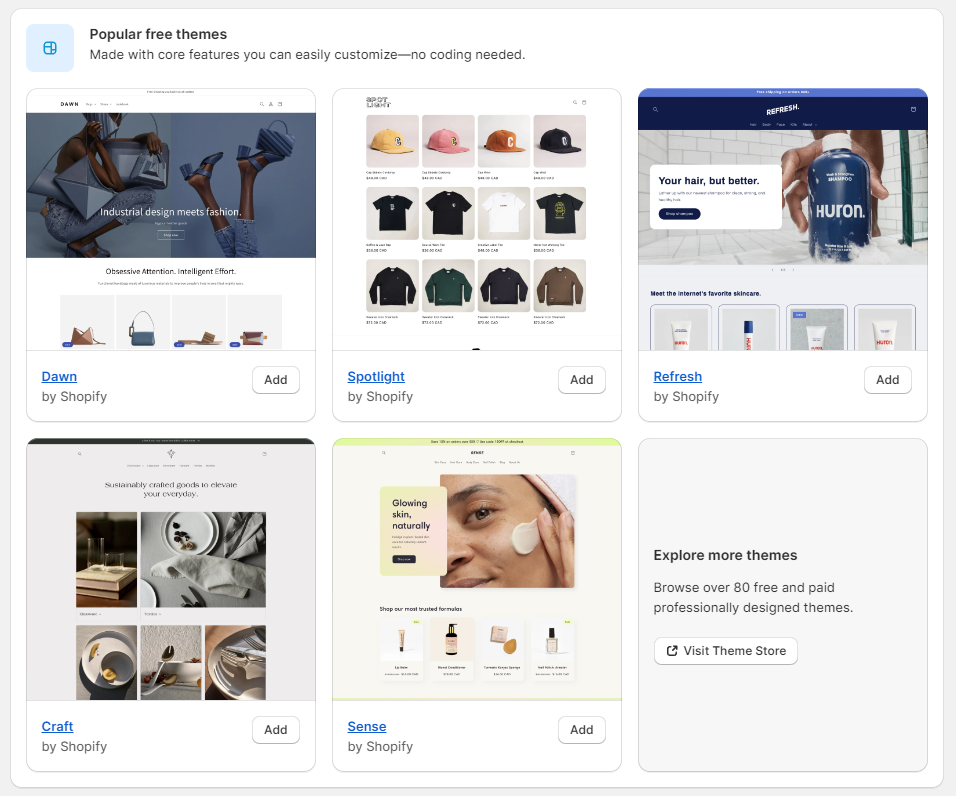
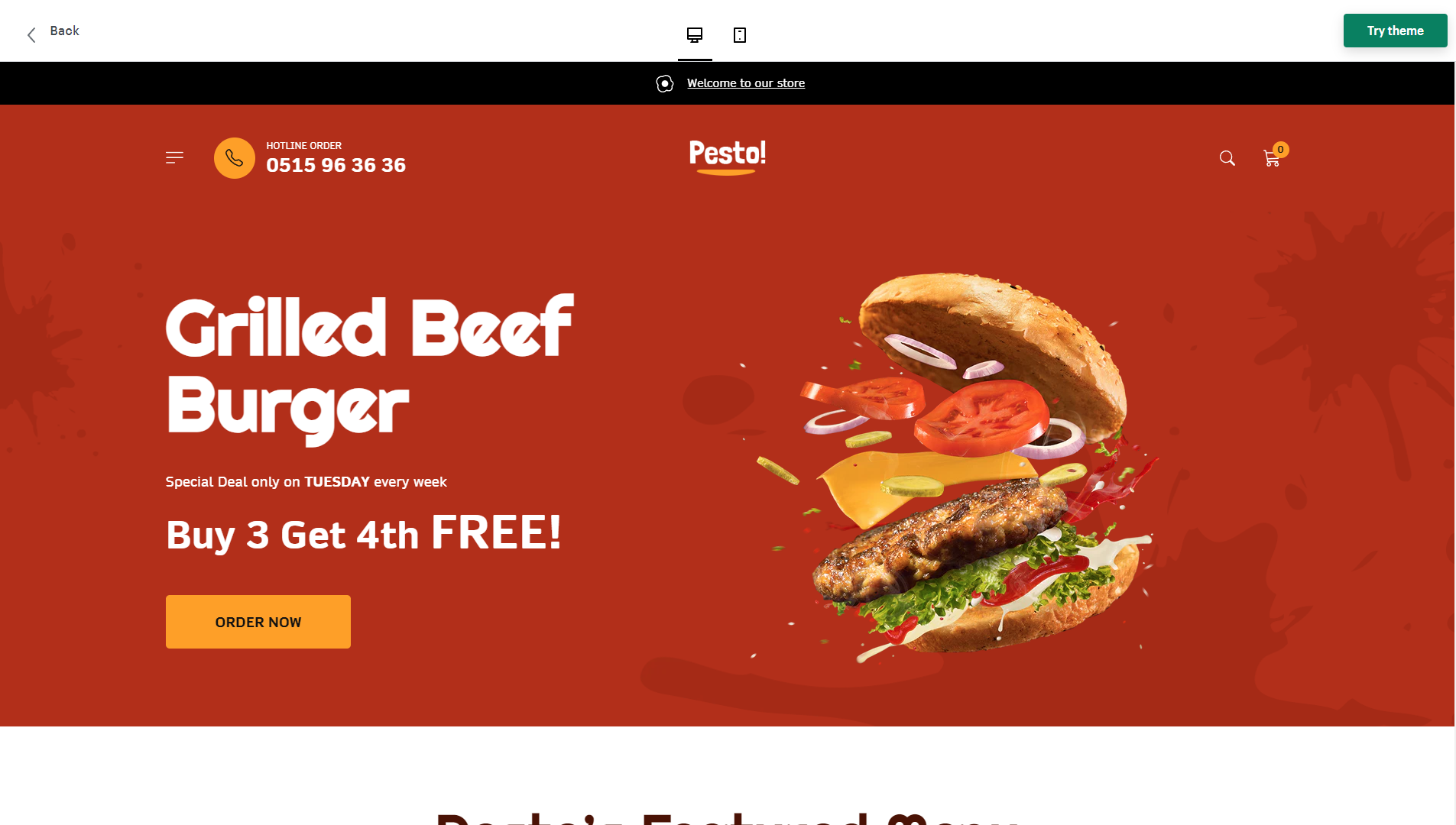
On the other hand, Volusion offers a variety of design templates tailored to meet the diverse needs of online stores and businesses. The platform provides users with over 30 professionally designed, responsive templates. These templates are crafted to cater to a wide range of industries, ensuring that businesses of all types can find a design that aligns with their brand identity and goals. The selection includes both free and premium options, allowing users to choose based on their budget and specific requirements.
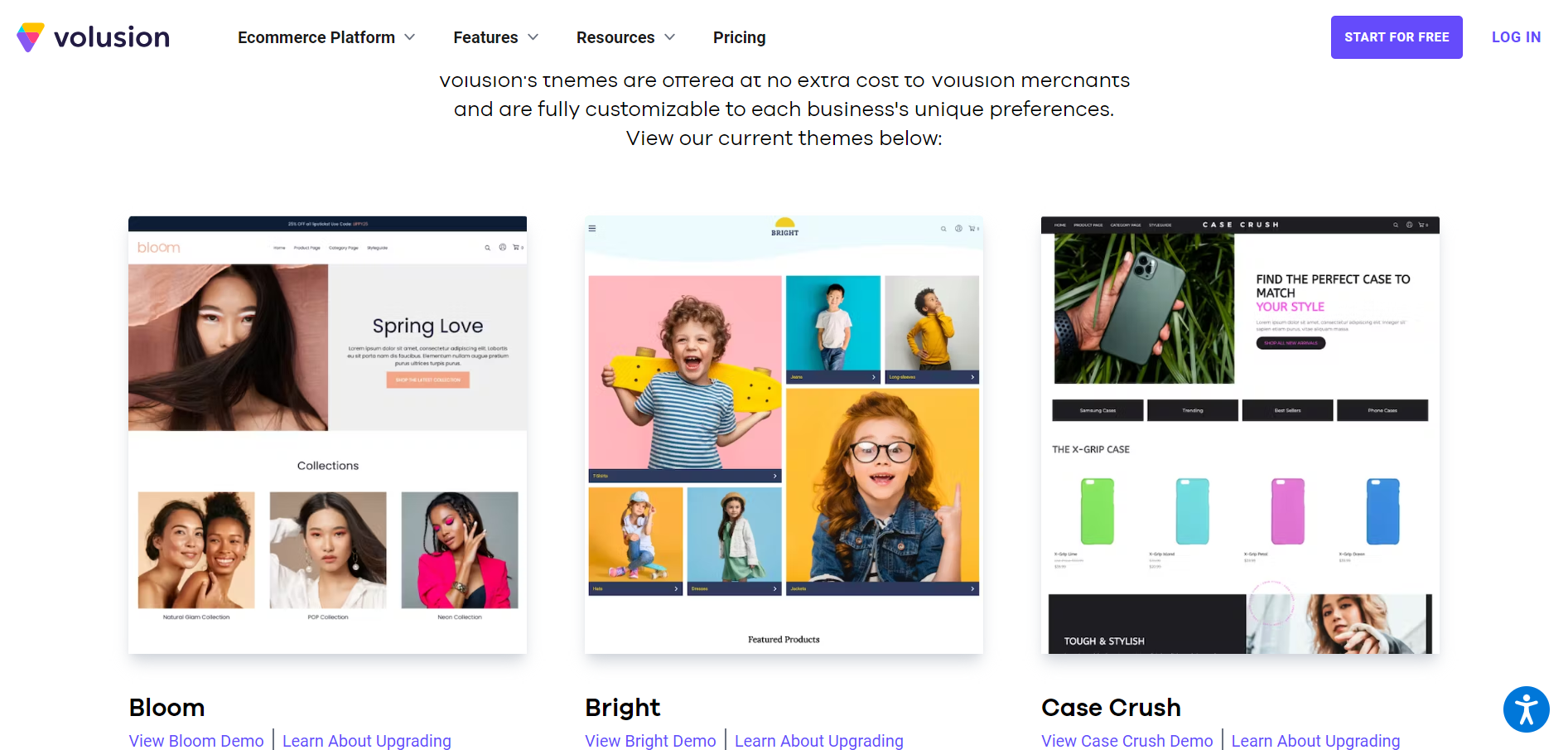
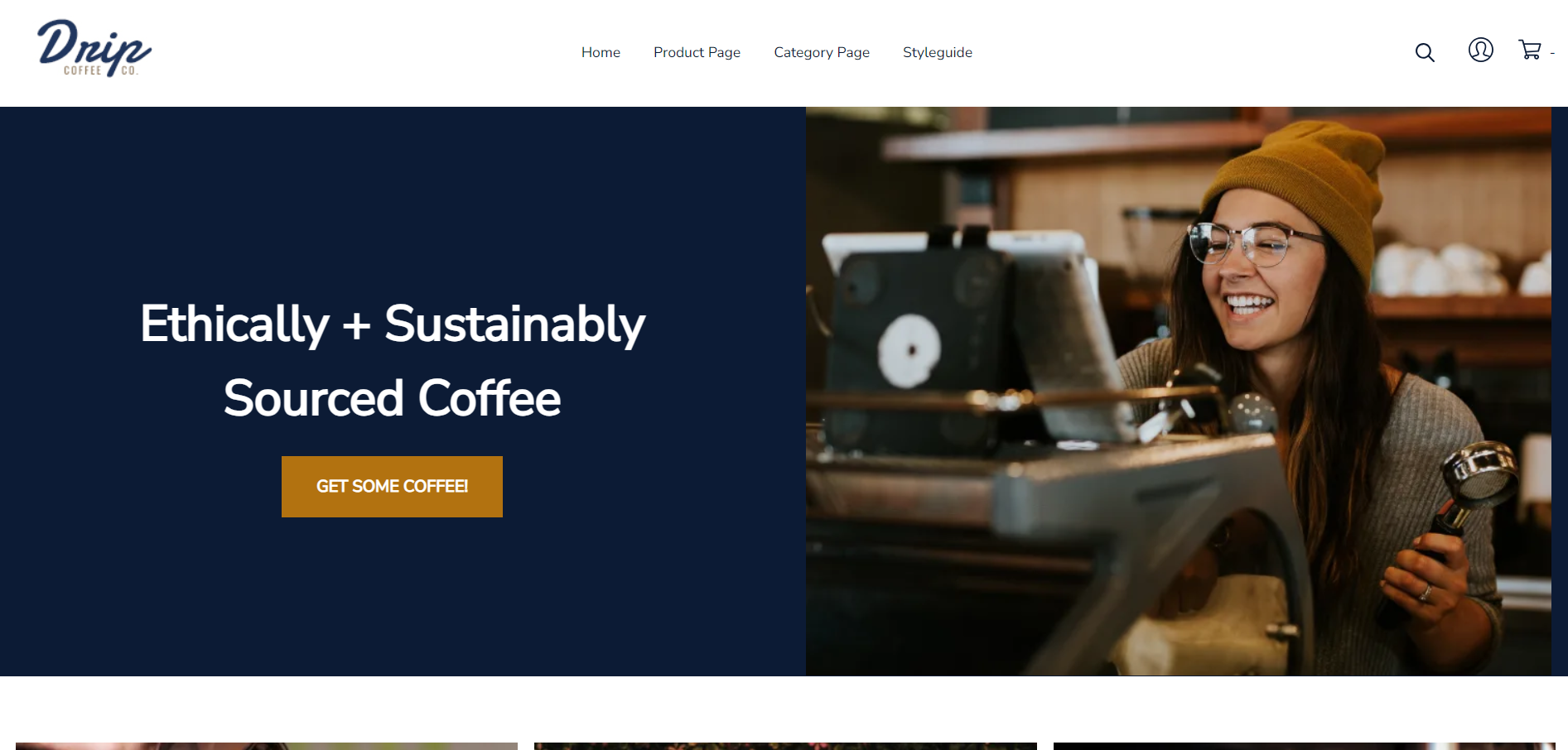
Get a head start on website creation with AI
Create a custom website tailored to your business needs 10X faster with 10Web AI Website Builder!
Ease of use
Ease of useReflects the platform’s overall user-friendliness.Score
Components:
- Learning curve (40%): Quickness and ease of getting started.
- Interface design (30%): Simplicity and intuitiveness of layout.
- User guidance (20%): Quality of tutorials and support.
- Flexibility (10%): Adaptability to various user skills.
 7.5
7.5
 6.9
6.9
🏆 Winner: Shopify
. Scoring 7.5, Shopify is widely praised for its exceptional ease of use, offering a drag-and-drop interface, intuitive layout, pre-built templates, and extensive resources for beginners. Volusion, with a score of 6.9, offers a user-friendly interface that caters to both beginners and experienced users, but some users may find the platform’s features and tools less intuitive compared to leading competitors.
Learning Resources
🏆 Winner: Shopify
. Both platforms offer solid learning resources, but Shopify goes a step further with its wide array of detailed tutorials and active community forums, making it easier for users to learn and adapt.
For ecommerce
EcommerceMeasures the platform’s effectiveness in supporting online business activities.Score Components:
- Ecommerce themes and templates (20%): Variety and design of templates.
- Product management (25%): Ease of managing and organizing products.
- Payment options (25%): Variety and convenience of payment methods.
- Ecommerce features (20%): Features for managing an ecommerce store.
- Integration (10%): Compatibility with external e-commerce tools and services.
 9.2
9.2
 7.1
7.1
Shopify and Volusion are both robust ecommerce platforms, but they cater to different needs. Shopify, with a score of 9.2, is a comprehensive solution for businesses of all sizes, offering a range of tools for product listing, payments, and order fulfillment. Volusion, scoring 7.1, is an all-in-one ecommerce solution designed to help businesses build, manage, and expand their online stores. However, it has bandwidth limitations, which can incur additional costs for high-traffic sites.

|

|
|
|---|---|---|
|
Ecommerce themes and templates |
8.2 |
6.5 |
|
Product page customization |
8.5 |
7.0 |
|
Payment processing and commissions |
8.8 |
7.5 |
|
POS capabilities |
8.1 |
7.0 |
|
Payment gateways |
9.5 |
7.5 |
|
Product numbers |
9.0 |
6.0 |
|
Additional ecommerce features |
9.1 |
7.0 |
Shopify ecommerce features:
- Comprehensive store builder
- Shopify Payments and other gateways
- Advanced inventory management
- Multi-channel selling
- Abandoned cart recovery
- Detailed analytics and reporting
Volusion ecommerce features:
- Ecommerce Product listings
- Payment Gateways
- Multiple Currencies support
- Shipping options
- SEO tools
- Social Media Integration
Ecommerce themes & templates
Shopify offers about 150 modern responsive themes for creating a virtual storefront, ensuring a good look on both desktop and mobile devices. While some themes are free, others cost between $170 to $380. On the other hand, Volusion offers 14 free themes and 38 paid themes, each costing $180. These templates are mobile responsive, ensuring that your online store is accessible and user-friendly across all devices.
Product page customization
Shopify has a limit of three options per product, totaling 100 unique variations. This limit may not pose a significant constraint, and it is suggested that for products with numerous options, creating separate listings on Shopify can be a more manageable approach. Volusion offers a range of ecommerce product page customization options to enhance the shopping experience. Users can modify product descriptions, images, and videos to showcase their items effectively. The platform allows for the customization of options and variants, such as size and color, to provide a more detailed and user-friendly product selection process.
Payment processing
Shopify offers payments with typical charges of 2.9% + 30¢ per online transaction on basic plans, and lower fees for higher-tier plans. However, it adds extra fees for using other payment gateways. Volusion offers a comprehensive eCommerce platform that supports various payment gateways, including PayPal, Stripe, and its own solution, Volusion Payments, tailored for U.S.-based merchants. The platform is distinctive for its low transaction fees, which vary based on the subscription plan. Additionally, Volusion provides POS capabilities, enabling seamless sales both online and in physical locations.
Website Editors
Website EditorsEvaluates the platforms’ website building and editing capabilities.Score Components:
- Customization tools (40%): Range and power of editing features.
- Editor usability (30%): User experience within the editor.
- Design flexibility (20%): Freedom in layout and design changes.
- Update and maintenance ease (10%): Simplicity of updating and maintaining the site.
 7.9
7.9
 7.1
7.1
🏆
Winner: Shopify
. Shopify, with a score of 7.9, excels in providing a streamlined, ecommerce-focused editing experience. It’s particularly beneficial for users who prioritize efficient management of online stores. The editor is straightforward, making it easy to add products, manage inventory, and set up payment methods. Shopify’s editor is optimized for sales and business growth, with built-in tools specifically designed for ecommerce businesses.
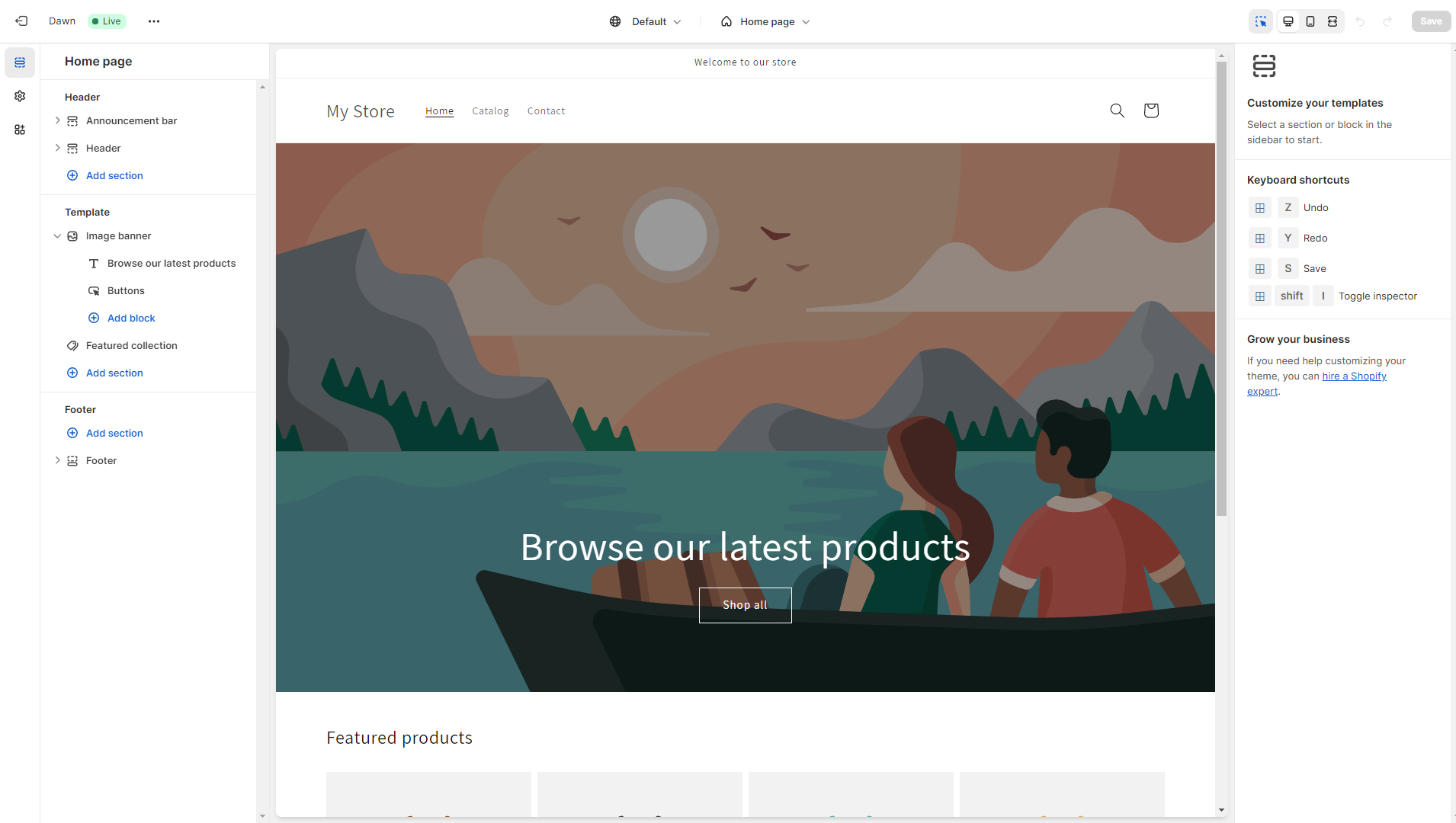
Volusion’s editor, scoring 7.1, is designed for ease of use, catering to both beginners and experienced users. It offers a drag-and-drop interface, allowing users to easily add, remove, or modify elements on their website without needing to code. Users can customize their site’s layout, adjust colors, fonts, and images, and even integrate various functionalities like social media links, shopping carts, and payment gateways. However, navigating through its more advanced settings and options requires a learning curve.
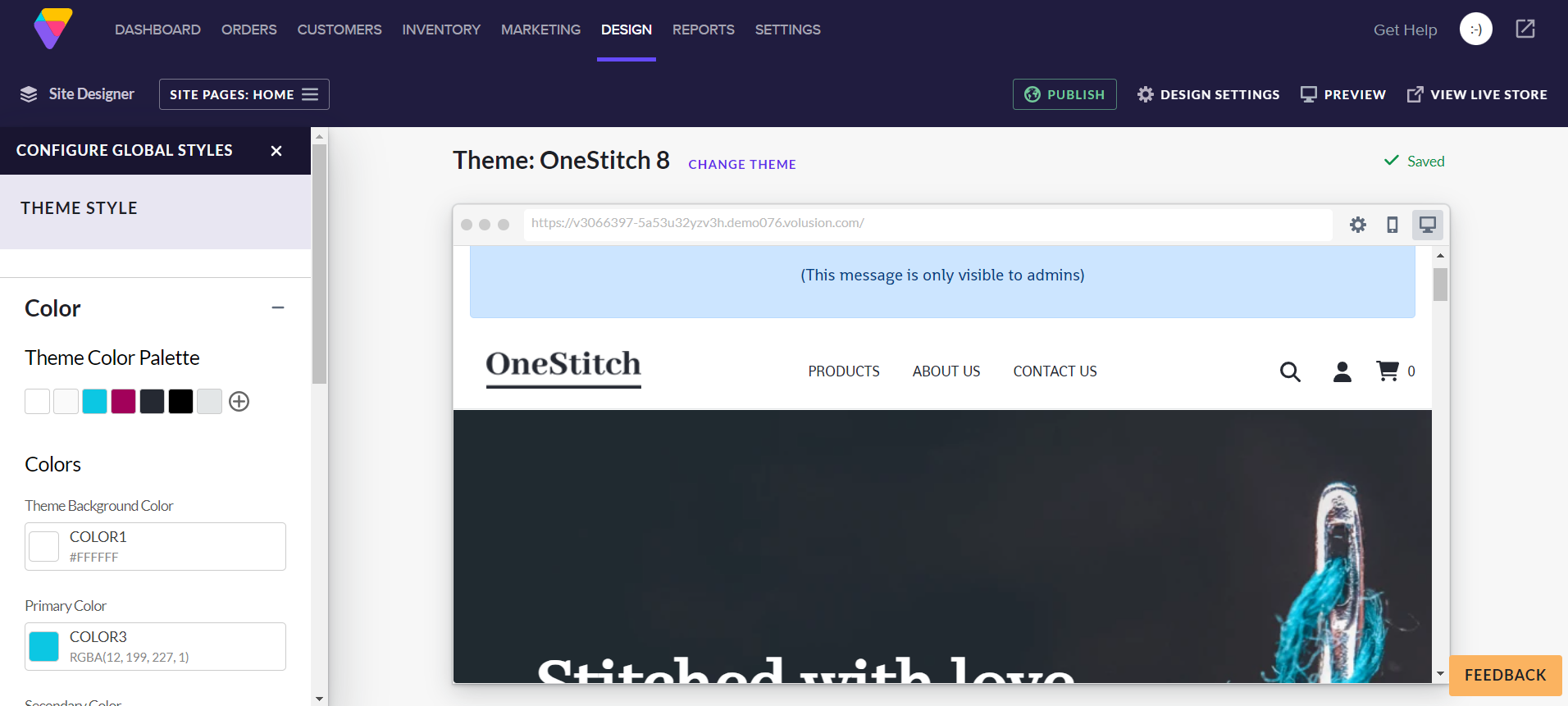
Mobile editor/app
 8.0
8.0
 4.5
4.5
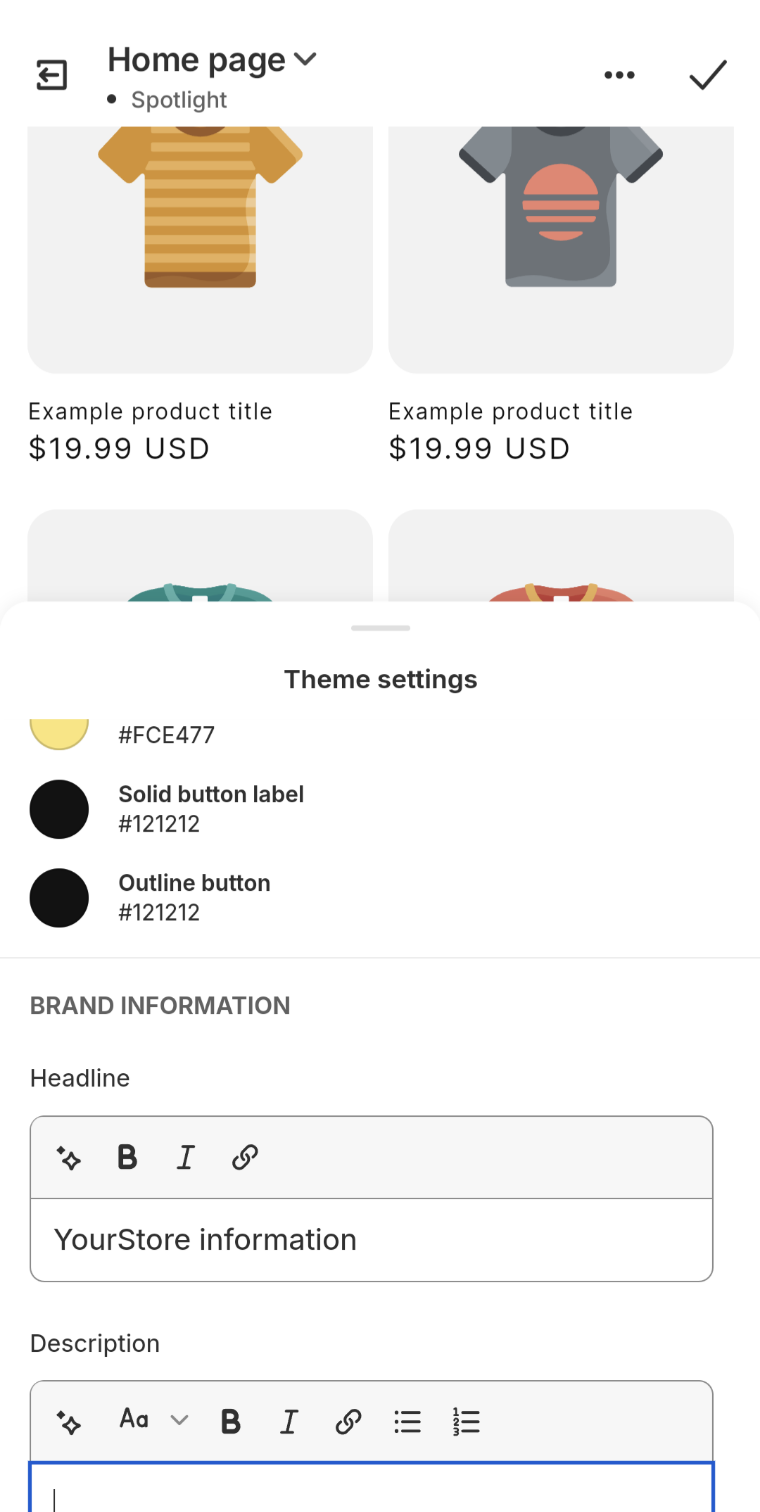
🏆
Winner: Shopify
. Shopify and Volusion both offer mobile capabilities, but they differ significantly in their approach. Shopify has a dedicated mobile app that allows users to customize their online store directly from their mobile device. This feature enables the addition, removal, editing, and rearrangement of content on the store’s website, offering convenient on-the-go adjustments to the store’s appearance and layout.
On the other hand, Volusion does not have a dedicated mobile editor app. While it is possible to edit on a mobile browser, the experience might not be optimal due to the smaller screen size, and navigating through the admin dashboard could be difficult. Therefore, Shopify is the clear winner in this category due to its dedicated mobile app and user-friendly mobile editing capabilities.
Product testing options
Product Testing OptionsAssesses the options for trying out platform features before commitment.Score Components:
- Trial quality (40%): Extent and usefulness of the trial or free version.
- Feature accessibility (30%): How many features are available to test.
- Trial duration (20%): Length of the trial period.
- Ease of transition (10%): Smoothness of moving from trial to paid plans.
 8.1
8.1
 7.6
7.6
Overall Result
:
Shopify wins
. Shopify scores 8.1, while Volusion scores 7.6 in product testing options. Both Shopify and Volusion offer a 14-day free trial, but Shopify allows testing of all features during the trial period, giving it an edge over Volusion.

|

|
|
|---|---|---|
|
Free Plan |
No | No |
|
Trial Duration |
14 days | 14 days |
|
Testing Premium Features |
All features during free trial |
Premium features during free trial |
|
Money Back Guarantee |
No (14-day free trial) | No |
Price
PriceLooks at the cost-effectiveness and value for money of each platform.Score Components:
- Plan value (40%): What each pricing tier offers.
- Transparency and clarity (30%): Clearness of pricing structures.
- Flexibility of plans (20%): Range of options to suit different budgets.
- Hidden costs (10%): Additional expenses not included in the plan.
 8.2
8.2
 7.6
7.6
Shopify and Volusion offer a range of pricing plans to cater to different business sizes and needs. However, Shopify scores slightly higher in terms of pricing, offering more value for the cost.

|

|
|
|---|---|---|
|
$20-$40 |
Shopify Basic ($29/month): Unlimited products, 2.9% + 30¢ card fee with Shopify payments, Extra 2% gateway fee without Shopify Payments, Abandoned cart recovery, Automated sales tax, Digital products, POS Integration, 2 staff accounts. Value for price: 8.0 |
Personal ($35/month): Suitable for small businesses, allowing up to 100 products, 1 staff account, and offers support via live chat and email. Supports stores with up to $50K in GMV/year. This plan allows to manage 1 website and there is no limitation of number of pages offered. Value for price: 6.5 |
|
$70-$80 |
Shopify Standard ($79/month): Lower card fees (2.6% + 30¢), Gift cards, Professional reports, 5 staff accounts. Value for price: 8.5 |
Professional ($79/month): Targets growing businesses with up to 5,000 products, 5 staff accounts, and additional features like newsletters, abandoned cart reports, and phone orders. Supports up to $100K in GMV/year. This plan allows to manage 1 website and there is no limitation of number of pages offered. Value for price: 7.5 |
|
$200+ |
Advanced Shopify ($299/month): Lowest card fees (2.49% + 30¢), Advanced report builder, Real-time carrier shipping, Up to 15 staff accounts Value for price: 8.8 |
Business ($299/month): Designed for large stores, offering unlimited products, 15 staff accounts, priority support, and integrations with Amazon and eBay. Supports stores with up to $500K in GMV/year. This plan allows to manage 1 website and there is no limitation of number of pages offered. Value for Price: 8.0 |
location. As a result in rare cases the prices displayed here can differ from the ones you see on their
websites.
Hosting quality
Hosting
qualityExamines the reliability and performance of the hosting solutions.Score Components:
- Uptime (40%): Consistency and reliability of website availability.
- Speed (30%): Loading times and performance.
- Bandwidth and storage (20%): Sufficiency of resources provided.
- Data centers (10%): Quality and distribution of hosting infrastructure.
 9.0
9.0
 7.0
7.0
Winner: Shopify
. Shopify’s proprietary cloud-based hosting, 99.99% uptime guarantee, and 5 global data centers make it a superior choice for hosting. Volusion, while offering managed cloud hosting and a 99.9% uptime guarantee, falls short due to lack of transparency about their data centers.

|

|
|
|---|---|---|
|
Do they offer hosting? |
Yes, included in all paid plans |
Yes, included in all paid plans |
|
Data Centers: |
5 globally: USA (Ashburn, Virginia; Santa Clara, California), Canada (Toronto, Ontario), Ireland (Dublin), and Singapore |
Volusion does not publicly disclose any information about their data centers |
|
Type of hosting: |
Proprietary cloud-based hosting |
Managed Cloud Hosting |
|
Uptime: |
99.99% |
99.9% |
|
Uptime Guarantee: |
Yes, 99.99% |
Yes, 99.9% |
Website Speed Optimization
Website Speed OptimizationEvaluates optimization of website loading timesScore Components:
- PageSpeed Score (30%): Google’s score indicating performance optimization.
- Loading Time (30%): The average time until a website is fully interactive.
- Mobile Optimization (15%): Optimization effectiveness for mobile devices.
- Resource Optimization (15%): Optimizing images, scripts, and other heavy resources.
- CDN Usage (10%): Use of CDN to enhance speed across geolocations.
 7.8
7.8
 7.1
7.1
🏆 Winner: Shopify
Both Shopify and Volusion place a high priority on website performance and page speed, with Shopify focusing on app efficiency and theme optimization, and Volusion emphasizing CDN, image optimization, code minification, regular monitoring and updates, and SEO optimization. However, Shopify gets a slight edge when it comes to website speed optimization.

|

|
|
|---|---|---|
|
Focus |
App efficiency, Theme optimization |
CDN, Image optimization, Code minification, Regular Monitoring and Updates, SEO optimization |
|
Performance Tools |
Google Lighthouse, PageSpeed Insights |
Google PageSpeed Insights Integration |
|
Key Strategies |
App efficiency, Theme optimization |
CDN, Image optimization, Code minification, Regular Monitoring and Updates, SEO optimization |
|
Load Times |
Varies widely, dependent on optimization |
Varies widely, depending on the optimization, website complexity |
|
Page Speed Scores Range |
Scores vary; influenced by apps, images |
Varies widely, depending on the optimization, website complexity |
|
Core Web Vitals Improvement |
Emphasis on LCP, FID, CLS improvements |
Implementing various performance optimization techniques |
Shopify’s approach to enhancing site speed includes app optimization by removing unneeded app code, conditionally loading apps, avoiding immediate pop-up displays, and incorporating app functionality directly into themes. This approach leverages Shopify’s fast servers and CDN network to boost load speed. Shopify also suggests utilizing Google AMP for faster mobile page loads, although with some design compromises.
On the other hand, Volusion focuses on CDN, image optimization, code minification, regular monitoring and updates, and SEO optimization to enhance website speed. It implements various performance optimization techniques for Core Web Vital improvements. However, both the load times and PageSpeed scores for Volusion vary widely, depending on the optimization and website complexity.
Get a head start on website creation with AI
Create a custom website tailored to your business needs 10X faster with 10Web AI Website Builder!
Plugins and integrations
Plugins and integrationsMeasures the range and effectiveness of additional plugins and integrations.Score Components:
- Variety of options (40%): Range of available add-ons.
- Integration smoothness (30%): Ease of integrating plugins into the site.
- Quality of plugins (20%): Functionality and reliability of the options.
- Custom integration capabilities (10%): Support for custom or third-party integrations.
 8.7
8.7
 6.8
6.8
🏆 Winner: Shopify.
With a score of 8.7, Shopify outperforms Volusion, which scores 6.8. Shopify offers over 8,000 apps in its App Store, covering a wide range of functionalities. These apps come with various pricing options, including free, paid, freemium, and one-time payment models. On the other hand, Volusion offers 82 integrations to enhance its ecommerce platform. While Volusion’s integrations offer advanced marketing, enhanced analytics, and superior customer service capabilities, Shopify’s breadth and depth, especially for online stores, give it the upper hand.
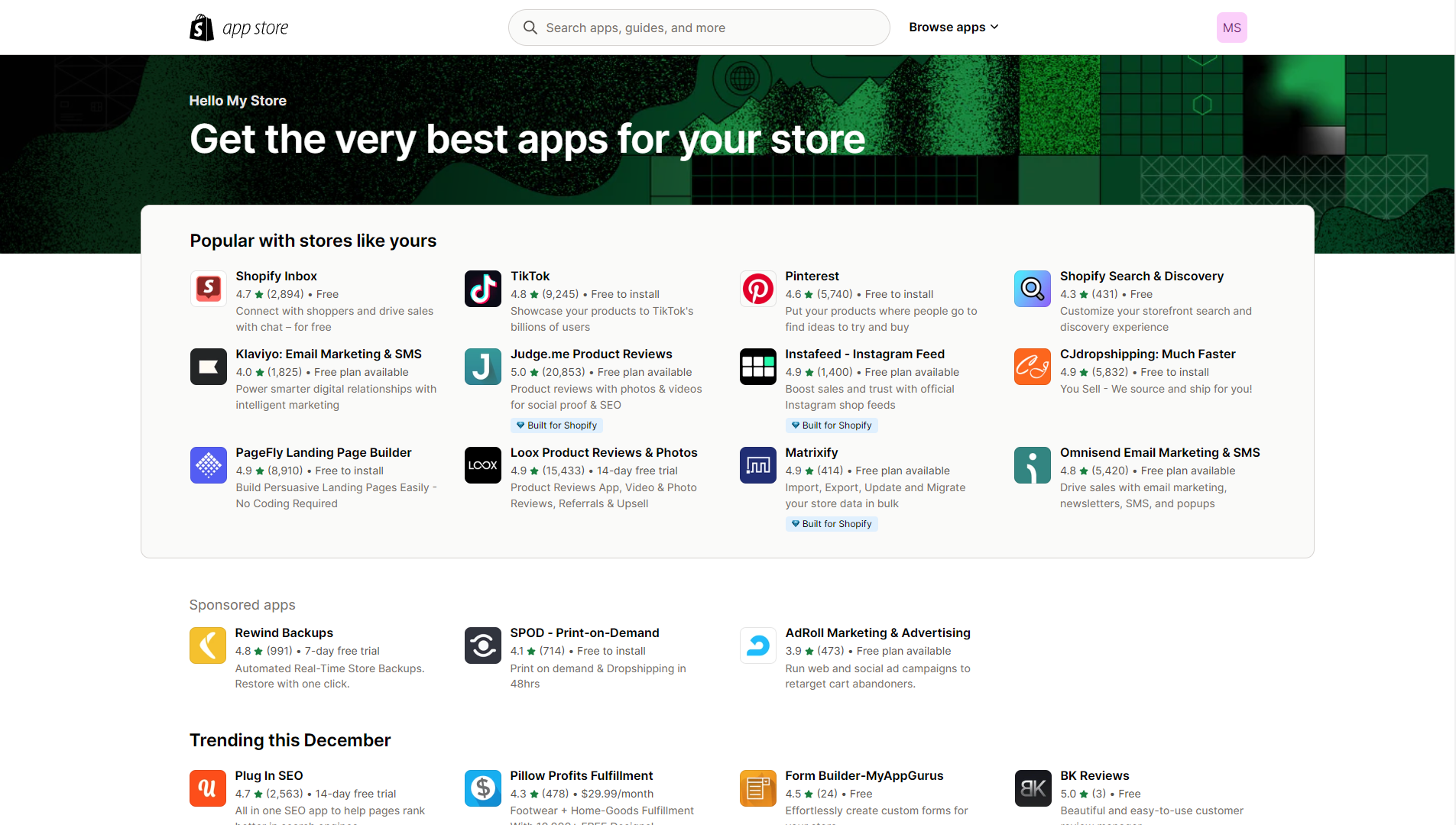
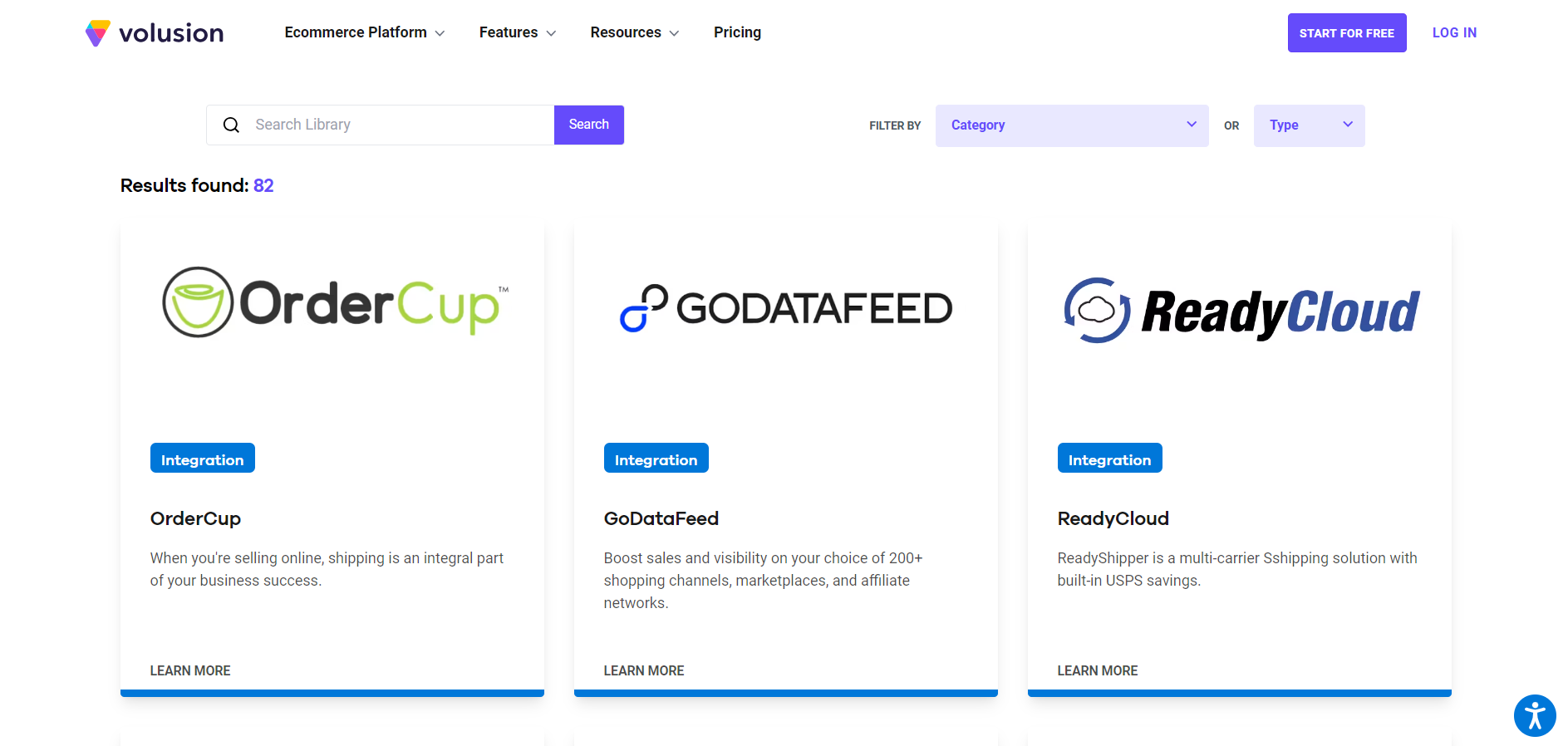
Marketing Features
Design FunctionalitiesRepresents how well each platform allows for creative design and customization of websites.Score Components:
- Template Variety (30%): Range and quality of design templates.
- Customization (30%): Flexibility and options for design alterations.
- User Interface (20%): Ease and intuitiveness of the design process.
- Responsiveness (10%): Adaptability to different devices and screen sizes.
- Innovation (10%): Unique design features and tools.
 8.8
8.8
 6.9
6.9
🏆
Overall Winner: Shopify
. Shopify stands out for its more advanced ecommerce-focused marketing tools, especially in analytics and ad campaign management. Volusion, while offering a range of marketing features, lacks blogging capabilities and has limited ads and promotions tools.

|

|
|
|---|---|---|
|
SEO Tools |
|
|
|
Email Marketing |
|
|
|
Blogging |
|
|
|
Social Media Integration |
Advanced integration for selling directly on social platforms |
Basic social media integration |
|
Analytics and Reporting |
Detailed analytics for in-depth insights |
Basic analytics for website traffic and engagement |
|
Ads and Promotions |
Google Ads integration; sophisticated ad campaign management |
Limited ads and promotions capabilities |
Customer Support
Customer supportEvaluates the quality and availability of support options.Score Components:
- Response time (40%): Speed of support responses.
- Support quality (30%): Effectiveness and helpfulness of the support.
- Availability (20%): Range of support channels (phone, chat, email).
- Resource richness (10%): Quality of self-help and educational materials.
 8.6
8.6
 7.0
7.0
🏆 Winner: Shopify
. Comparing Shopify vs Volusion, Shopify takes the lead in this category with a customer support score of 8.6. Shopify offers 24/7 support through chat, email, and phone, ensuring that users can get help whenever they need it. The platform also provides clear tutorials, an extensive community forum, and a valuable marketing blog, making it easier for users to find solutions and grow their businesses.
Volusion, with a customer support score of 7.0, offers support via phone during business hours and 24/7 chat support through the Merchant Center dashboard. While Volusion provides adequate support, including a dedicated client success manager for enterprise-level customers, it falls short compared to Shopify’s round-the-clock availability and comprehensive resources.
Security
SecurityLooks at the platforms’ security measures and data protection.Score Components:
- Data protection (40%): Safeguards for user and customer data.
- SSL and encryption (30%): Implementation of secure connections.
- Compliance (20%): Adherence to industry security standards.
- Regular updates (10%): Frequency of security updates and patches.
 9.0
9.0
 8.7
8.7
🏆
Winner: Shopify
. Shopify’s security measures are slightly more comprehensive than Volusion’s, earning it a higher security score. Shopify prioritizes data privacy and security through rigorous measures, including secure infrastructure, encryption, and limited access. They comply with data privacy regulations, practice data minimization, and ensure user control and transparency. Additional security measures include two-factor authentication, regular audits, and a dedicated incident response team.
Volusion also prioritizes the storage and protection of private data through a series of comprehensive security measures designed to safeguard sensitive information. To protect private data, Volusion employs data encryption techniques which ensure that customer and business data are stored securely and are only accessible through authorized means. This encryption applies to personal information, payment details, and any transactional data handled by the platform. Volusion also implements two-factor authentication (2FA), to further secure user accounts and sensitive information from unauthorized access. However, these measures were not enough to surpass Shopify’s security score.
AI Capabilities
AI capabilitiesMeasures the effectiveness of AI-driven features and tools.Score Components:
- Automation efficiency (40%): Impact of AI on streamlining processes.
- Personalization (30%): AI-driven customization for users or customers.
- AI-Assisted design (20%): Role of AI in website design and functionality.
- Data analysis (10%): Use of AI in interpreting user data and analytics.
 7.9
7.9
 0.0
0.0

|

|
|
|---|---|---|
|
Personalized Design |
Shopify AI Builder offers personalized design suggestions |
|
|
SEO Optimization |
AI-driven recommendations for better search engine visibility |
|
|
Customer Behavior Analysis |
Advanced analytics to understand customer preferences |
|
|
Sales Predictions |
AI-powered sales forecasting tools |
|
|
Inventory Management |
AI tools to assist in efficient inventory handling |
|
|
Content Generation |
Shopify’s AI features Content Assistant for content generation |
|
🏆 Winner: Shopify
. Shopify, with a score of 7.9, utilizes AI mainly to enhance the ecommerce experience. Its AI features focus on customer behavior analysis, personalized shopping experiences, inventory management, and sales predictions.
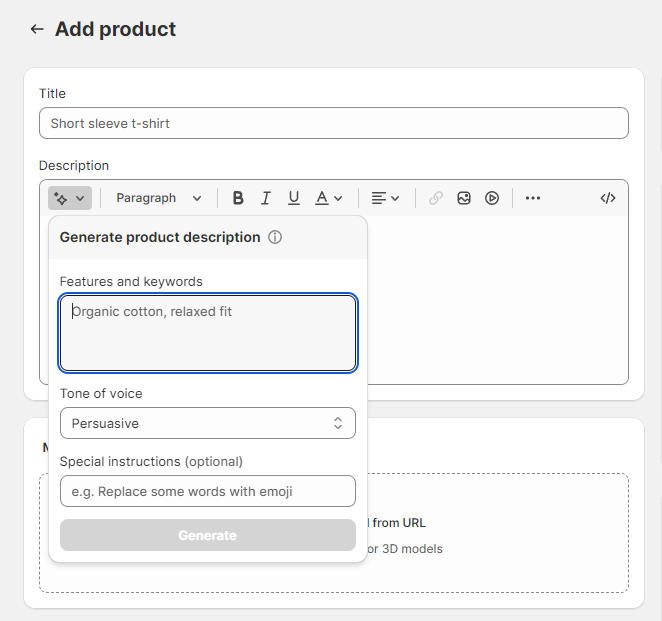
On the other hand, Volusion does not have any AI capabilities. This lack of AI features can limit the functionality and user experience of the platform.
User Management
User ManagementAssesses the platforms’ capabilities in managing user roles, permissions, and accessibility.Score Components:
- Role Customization (40%): Flexibility in creating and defining user roles and
permissions. - Ease of Management (30%): User interface and tools for managing users.
- Access Control (20%): Effectiveness of access control measures for different user
levels. - Scalability (10%): Ability to manage a growing number of users efficiently.
 6.5
6.5
 7.7
7.7
🏆 Winner: Volusion
. Both Shopify and Volusion offer different user roles with varying access levels, but Volusion provides a more detailed description of its user management system.
-
Shopify enforces staff account limits based on plans, ranging from 2 to 15, with Shopify Plus offering unlimited
accounts. Collaborators with limited access are also an option. - Volusion offers customizable user account management with various roles and permissions tailored for efficient online store operation. These roles, including Administrator, Editor/Manager, Customer Service, and Marketing, provide different access levels for tasks like site design, order processing, and analytics. Subscription plans determine the number of staff accounts available: 1 in the Personal Plan, 5 in the Professional Plan, 15 in the Business Plan, and unlimited in the Prime Plan.
Shopify User Roles and Access Levels:
| Role | Description | Access Highlights |
|---|---|---|
| Store Owner | Full control over store | Manage products, orders, discounts, payments, apps, settings. Create and manage staff accounts. |
| Staff | Configurable access by owner |
Add/edit products, manage orders, fulfill orders, manage customers, update content. Access level can be customized by the owner. |
| Collaborator | Limited access for external partners | View and manage specific sections like blog or product categories. Cannot access full store settings. |
Unfortunately, Volusion does not provide a user roles table for a more detailed comparison.
Additional Features

|

|
|
|---|---|---|
|
SSL Certificate |
|
|
|
Custom Domain |
|
|
|
Free Custom Domain Included |
|
|
|
International Domains |
|
|
|
Mobile Responsive |
|
|
|
Page Speed |
|
|
|
Website Builder Mobile App |
|
|
|
Convert a Website To An App |
|
|
|
Website Analytics |
|
|
|
Multilingual Sites |
|
|
|
Multiple Users |
|
|
Shopify vs Volusion: User Feedback
Shopify’s slightly higher rating on G2 Crowd can be largely attributed to its specialization in ecommerce. Its comprehensive features, ease of use, and robust customer support cater specifically to online businesses, leading to high user satisfaction among those seeking a dedicated ecommerce solution.
Volusion, on the other hand, is appreciated for its affordability and simplified user interface, making it suitable for non-tech users. However, users have raised concerns about its limited integrations and frequent technical issues, such as crashes and slow support responses. Some feel that Volusion lacks the advanced features and customization options offered by competitors like Shopify, making it less competitive in the market. Despite these drawbacks, Volusion remains a feasible option for small to medium-sized businesses seeking a budget-friendly solution for establishing an online store.
The making of this blog
We followed a clear, step-by-step process to write and research this article.
Shopify vs Volusion: FAQ
Which platform is better for ecommerce, Shopify or Volusion?
Can I build an informational or business website with Shopify or Volusion?
How do Shopify and Volusion compare in terms of design and templates?
Which platform offers better customer support, Shopify or Volusion?
Are Shopify and Volusion secure platforms for online stores?
Which platform is more user-friendly for beginners?
How do Shopify and Volusion handle website speed and performance?









